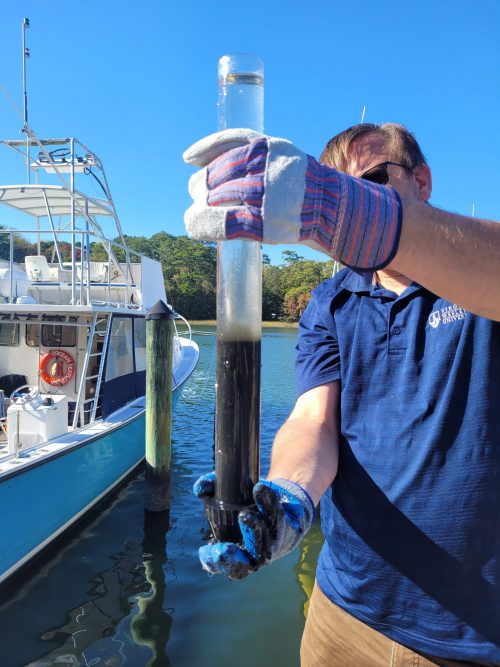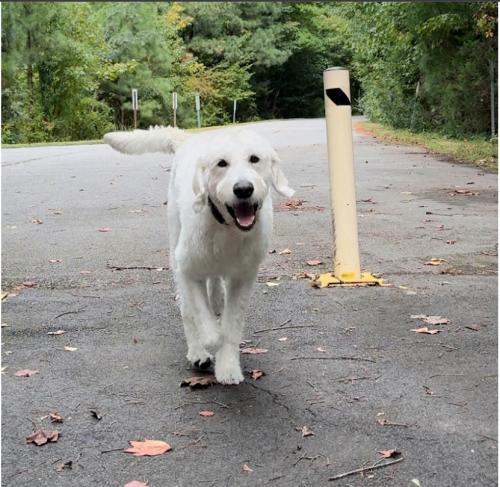Shaus samples during a trip on the Ocean Explorer in 2022.
Kimberly Koscinski|Courtesy
The Ocean Explorer, a boat purchased and maintained through an agreement with the Virginia Aquarium & Marine Science Center and Virginia Wesleyan, is being sold.
On Aug. 23, Dr. Victor Townsend, professor of Biology and dean of the Joan P. Brock School of Mathematics, informed faculty members by email not to schedule trips on the Ocean Explorer for the 2024 Fall Semester and that the vessel was going to be sold.
Purchased in 2009 through a partnership with the Virginia Aquarium, this vessel has been used in multiple classes including Oceanography, Marine Ecology and Marine Invertebrate Zoology. “We split the operating costs and the maintenance costs with them,” Townsend said.
Dr. Soraya Bartol is the supervisor of the Ocean Explorer and is on sabbatical at this time. When asked for details on the vessel, Bartol wrote “I too just found out that the Ocean Explorer was being sold and I do not have the latest information.”
Townsend assured that this decision will not affect students. “It’s not going to have a student impact at all,” he said. “The funding available for renting boats is more than sufficient to supply the courses that we currently offer with access to boats,” Townsend said.
Students still have access to the water monitoring equipment and trawl, according to Townsend, “all of that is housed in Greer when it’s not in use.”
Classes will have the same amount of boat trips as previous semesters. “The University is committed to offering the same educational opportunities as last year as they will have this year, as well as in the future,” Townsend said.
Those pursuing a minor in Marine Science are familiar with the watercraft. Bartol said there are currently 23 students pursuing the minor. Harry Smith, a senior and Biology major, has spent a significant amount of time on the vessel for BIO 319 Studies in Marine Coastal Environments. “We spent 19-20 hours on that boat,” Smith said.
Because Smith thought access to the Ocean Explorer would be through “one of the super upper level classes,” he didn’t expect to have as much time on the vessel as he did.
Smith was aware of the watercraft before enrolling at VWU. “I had heard about a partnership with William and Mary, VIMS, and the aquarium about a research vessel … It was definitely a factor in picking Wesleyan,” Smith said.
In the beginning of the semester, Smith said he reached out to Bartol about the future of the vessel. Smith also brought up his concerns to Susan Larkin, provost and vice president for Academic Affairs, through an email. “Raising my concerns with the school community was a very professional process,” Smith said. “She got back to me, it was like eight minutes.”
Dr. Maynard Shaus, professor of Biology and Environmental Science, is the current Oceanography professor. He has had to restructure the syllabus as a result of the vessel not being available.
When making a syllabus for a class, professors traditionally adapt the schedule from the previous year, according to Shaus. The news was “fairly late notice, not when we were drawing up the schedules,” Shaus said.
Finding a boat “took a little scrambling at the last minute, but we were able to do it,” Shaus said. Instead of the Ocean Explorer, he said students will be going out on one of Old Dominion University’s vessels.
This semester Shaus is looking forward to new activities for the oceanography class. “We’re also using other resources in the area, like the Elizabeth River Project’s Ryan Resilience Lab,” he said. While there, Shaus mentioned that students will study sea level rise and coastal sustainability.
“The students are still going out on boats this fall,” Shaus said. “It’s just going to be a different boat.”
“Oceanography lab is not just going out on the boat,” Shaus said. “Instead of on the Atlantic Ocean it’s going to be on the Chesapeake Bay.”
Although the boat used for the field trips will be different, the opportunities afforded to students will be the same.
By Clay Yokom

